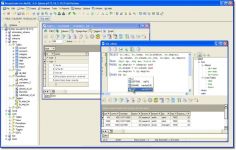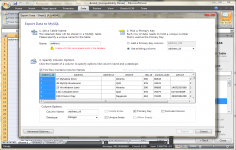 MySQL 5.1.60
MySQL 5.1.60
MySQL AB - (Open Source)
MySQL is a successful open source database used in most web applications, e-commerce and online transaction processing.
MySQL is one of the world's most famous and used open source database. The software can be used to manage web applications, e-commerce and online transaction processing since MySQL database incorporates support those transactions. It is also commonly associated with PHP when it comes to managing websites.
With standard JDBC , ODBC, and Net, the developer can choose the programming language. MySQL has the advantage of working with almost all the popular operating systems and communicate easily with programming languages ​​such as C, C + +, VB, C #, PHP, Python, Ruby, Java, Perl, Eiffel, etc.MySQL replication allows you to create profitable applications. In addition, it enables the development of typologies replication complex and massive chain.Its reliability and robustness, performance, ease of use makes MySQL have more success than anticipated.
- Title:
- MySQL 5.1.60
- File Size:
- 38.9 MB
- Requirements:
- Windows 9x / 2000 / XP / Vista / Windows7 / Windows8
- Language:
- en-us
- License:
- Open Source
- Date Added:
- 20 Nov 2011
- Publisher:
- MySQL AB
- Homepage:
- http://www.mysql.com
- MD5 Checksum:
- 2600A32281D74ACCE5C29DE53A602704
# Bugs Fixed
* InnoDB Storage Engine: This fix improves the performance of instrumentation code for InnoDB buffer pool operations.
* InnoDB Storage Engine: Data from BLOB columns could be lost if the server crashed at a precise moment when other columns were being updated in an InnoDB table.
* InnoDB Storage Engine: Lookups using secondary indexes could give incorrect matches under a specific set of conditions. The conditions involve an index defined on a column prefix, for a BLOB or other long column stored outside the index page, with a table using the Barracuda file format.
* InnoDB Storage Engine: This fix corrects cases where the MySQL server could hang or abort with a long semaphore wait message. (This is a different issue than when these symptoms occurred during a CHECK TABLE statement.)
* Replication: Issuing the following statements, in the order shown, could cause a deadlock between the user thread and I/O thread:
START SLAVE;
STOP SLAVE SQL_THREAD;
START SLAVE;
* Internal conversion of zero to binary and back could yield a result with incorrect precision.
* Valgrind warnings generated by filesort operations were fixed.
* Several improvements were made to the libedit library bundled with MySQL distributions, and that is available for all platforms that MySQL supports except Windows.
- Navigation keys did not work for UTF-8 input.
- Word navigation and delete operations did not work for UTF-8 input with Cyrillic characters.
- Nonlatin characters were corrupted in overwrite mode for UTF-8 input.
- Long queries caused the statement history file to become corrupted.
- The Alt key caused history operations to fail.
* The help message for mysql_install_db did not indicate that it supports the --defaults-file, --defaults-extra-file and --no-defaults options.
* An assertion designed to detect zero-length sort keys also was raised when the entire key set fit in memory.
* myisampack could create corrupt FULLTEXT indexes when compressing tables.
* OPTIMIZE TABLE could corrupt MyISAM tables if myisam_use_mmap was enabled.
* If MySQL was configured with --without-plugin-innobase and --with-plugin-innodb_plugin, to suppress building the built-in InnoDB storage engine and build the InnoDB Plugin instead, the innochecksum utility was not built.
* A linking problem prevented the FEDERATED storage engine plugin from loading.
* On Fedora, certain accesses to /var/lib/mysql/HOSTNAME.err were blocked by SELinux policy, which made the server fail at startup with the message: Manager of pid-file quit without updating file
* For FEDERATED tables, loss of connection to the remote table during some insert operations could cause a server crash.
Related software
4.7/5 from 47 users


